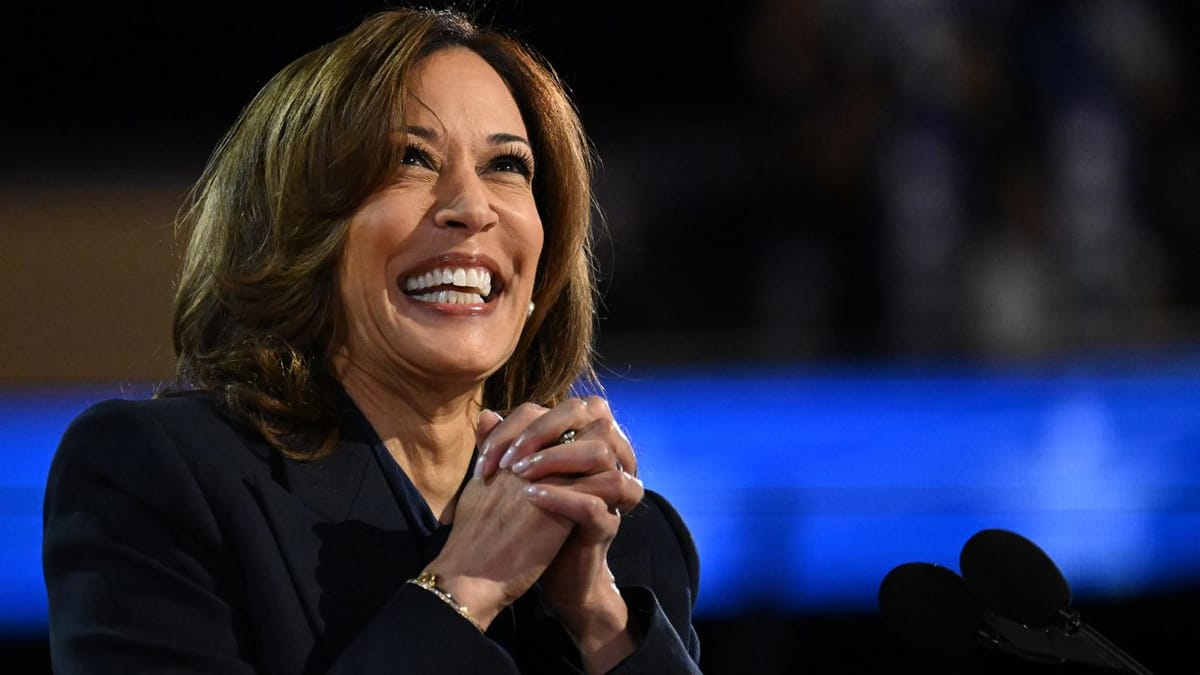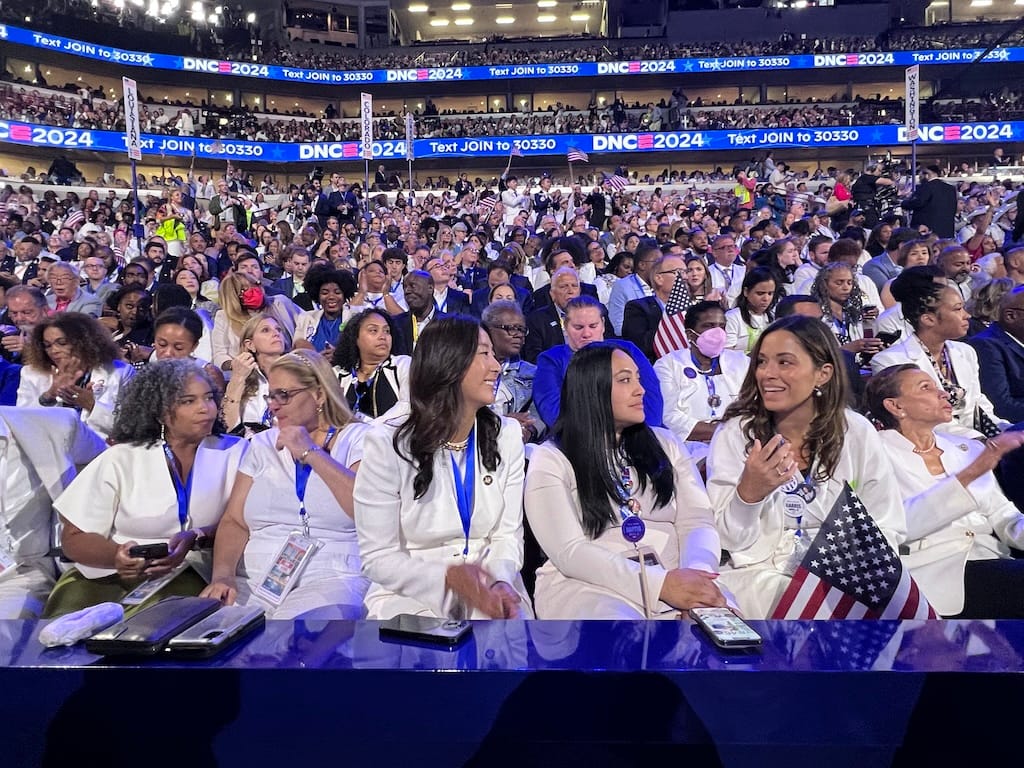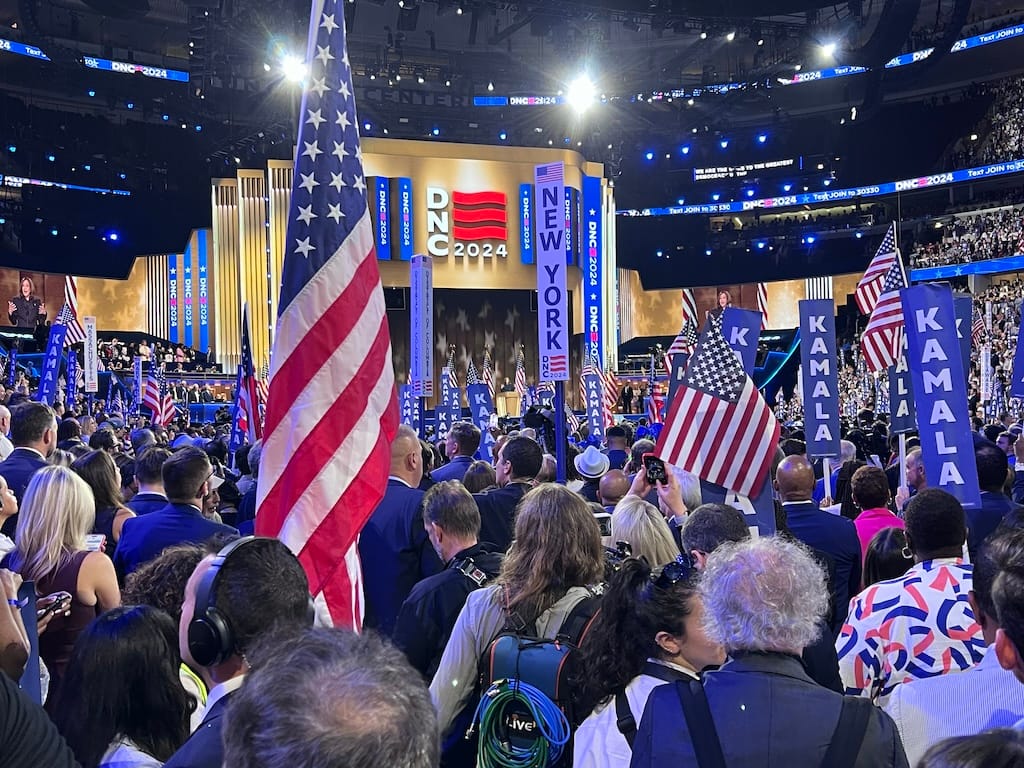Harris Accepts Democratic Nomination, Vows Support for Rule of Law and Common Sense
Artificial intelligence only tech or telecom issue mentioned by Harris in acceptance speech.
Jericho Casper

CHICAGO, August 22, 2024 – Vice President Kamala Harris officially accepted the Democratic Party’s nomination for president on Thursday with a promise to put country above party and self, pledging to support the rule of law and the peaceful transfer of power, and excoriating former President Donald Trump for his refusal to do so.

Harris closed the party’s four-day convention here with a rally to unite the country “around our highest aspirations” and to be “a president who leads and listens, who is realistic, practical, and has common sense.” She also defined her candidacy in opposition to the return of Trump, the Republican Party presidential candidate.
“Consider what he intends to do if we give him power again,” Harris said, nearly mid-way through her 38-minute speech. “Consider his explicit intent to set free violent extremists who assaulted those law enforcement officers at the Capitol, his explicit intent to jail journalists, political opponents, and anyone else he sees as the enemy.”
Harris spoke briefly about what she called an “opportunity economy where everyone has the chance to compete and the chance to succeed,” and promised a focus on the middle-class.
She cited the need to “lower the cost of everything needs like health care and housing and groceries,” and said that her administration would “provide access to capital for small business owners and entrepreneurs and founders.”
No mention of broadband, but a fleeting reference to AI
Harris made no mention of the economic priorities of the Biden administration, including the bipartisan infrastructure bill, the CHIPS and Science Act, and the green energy provisions of the Inflation Reduction Act. She also made no mention of the environment, either.

But artificial intelligence did receive a fleeting message, in the context of her role as commander-in-chief, if elected:
"I will ensure America always has the strongest, most lethal fighting force in the world, and I will fulfill our sacred obligation to care for our troops and their families, and I will always honor and never disparage their service,” she said, continuing: “I will ensure we lead the world into space and artificial intelligence, that America, not China, wins the competition for the 21st Century."
How Harris might differ from Biden or another Trump administration
In advance of the acceptance speech, all of these economic, environmental and other issues were addressed at length by other speakers at the convention.
The broadband aspect of the Infrastructure Investment and Jobs Act was mentioned in speeches on Day 1 by Communications Workers of America President Claude Cummings.
Environmental policy and environmental justice were touted earlier on Thursday in a speech by Rep. Maxwell Frost, D-Fla.
Relatively untouched on the convention's main stage, however, were technology issues such as Section 230, privacy, antitrust and – except for Harris’ brief AI reference in her acceptance speech – artificial intelligence.
Section 230
The 2024 Democratic platform advocates for new tech regulations, with one of the most significant proposals being a call to "fundamentally" reform Section 230—the law that protects online platforms, including companies like Meta and Google, from being held liable for content posted by users' on their platforms.

This marks a departure from previous platforms, reflecting growing concerns within the party about the power of big tech companies to influence public discourse and avoid liability for such content.
Competition and antitrust
The 92-page Democratic platform emphasizes the importance of competition, mentioning the word 18 times—double the occurrences in the 2020 platform. (The Republican platform for 2024 contains just three references to competition.)
The platform also reiterates the need for new laws that promote competition and privacy in the tech sector, echoing the goals of a number of antitrust bills that passed the House Judiciary Committee in 2021.
These unsuccessful bills sought to enhance interoperability between online services, enable users to control and transfer their data, and prevent technology platforms from prioritizing their own products and services over competitors.
The bills were not brought to the House floor in 2021 or 2022. Since Republicans regained control of the chamber in 2023, no such bills have advanced to committee.
Commerce Secretary Gina Raimondo reinforced this vision during her speech on the first night of the convention, stating that Harris would “forge an economy with fair competition, free from monopolies. Monopolies that crush workers, small businesses, and startups.”
Protecting Kids Online
The Democratic platform also acknowledged the growing challenges posed by digital technology, dedicating an entire section to “Protecting Kids Online, Strengthening American’s Data Privacy and Promoting Competition.”
“Democrats will pass bipartisan legislation to protect kids’ privacy and to stop Big Tech from collecting personal data on kids and teenagers online, ban targeted advertising to children, and put stricter limits on the personal data these companies collect on all of us,” the platform read.
Harris has already expressed her support for the Kids Online Safety and Privacy Act, which recently passed the Senate with overwhelming bipartisan support, and is currently being reworked.
Artificial intelligence
The platform also featured a new section on “Seizing the Promise and Managing the Risks of AI,” addressing the need to combat biases in artificial intelligence and banning “voice impersonations.” In the 2020 platform, AI was briefly mentioned in the context of U.S. competitiveness, highlighting how the technology has since become a more pressing issue.
Concerns, or hopes, from Silicon Valley
Despite these progressive stances, some speculate that Harris’s ties to Silicon Valley by virtue of serving California’s senator from 2017 to 2021 might influence her approach to technology regulation.
Some critics argue that as California’s Attorney General, Harris did little to curb the power of tech giants.
Broadband Breakfast Publisher Drew Clark contributed to this news report.











Member discussion